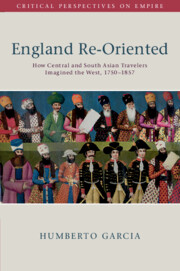Book contents
- England Re-Oriented
- Critical Perspectives on Empire
- England Re-Oriented
- Copyright page
- Dedication
- Epigraph
- Contents
- Figures
- Acknowledgments
- Note on Transliteration
- Introduction
- 1 The British Raj’s Mimic Men
- 2 A Bluestocking Romance
- 3 The Theater of Imperial Sovereignty
- 4 Loving Strangers in Ireland
- 5 Heavenly Bodies in Motion
- 6 Dreaming with Fairyland
- 7 The Making of a Mohamedan Gentleman
- Epilogue
- Book part
- Select Bibliography
- Index
Introduction
Why Re-Orient?
Published online by Cambridge University Press: 06 November 2020
- England Re-Oriented
- Critical Perspectives on Empire
- England Re-Oriented
- Copyright page
- Dedication
- Epigraph
- Contents
- Figures
- Acknowledgments
- Note on Transliteration
- Introduction
- 1 The British Raj’s Mimic Men
- 2 A Bluestocking Romance
- 3 The Theater of Imperial Sovereignty
- 4 Loving Strangers in Ireland
- 5 Heavenly Bodies in Motion
- 6 Dreaming with Fairyland
- 7 The Making of a Mohamedan Gentleman
- Epilogue
- Book part
- Select Bibliography
- Index
Summary
Montesquieu’s Lettres Persanes, Giovanni Paolo Marana’s Letters Writ by a Turkish Spy, Oliver Goldsmith’s Citizen of the World, and James Justinian Morier’s Hajji Baba: novels about Eastern travelers in Europe and Britain that encouraged eighteenth- and nineteenth-century British readers not only to see themselves as foreign but also to locate their national home in pan-Eurasia. They were not merely exoticizing the Orient, they were living its fiction. By the 1810s, many people in Britain were strutting in “Mirza turbans,” dancing to Persian music, speaking Persian, and raising toasts to the shah of Iran, with ladies displaying Eastern-style hairdos, riding Arabian horses, and sporting elegant Kashmir shawls. Most of these revelers were native-born Britons who had discovered foreignness within themselves, a borderless sense of belonging that Julia Kristeva considers the condition for an ethical and political reckoning with alterity in nationalist self-understandings. Unruly crowds swelled by the hundreds in London, from Mansfield Street to Piccadilly, to pay homage to their fashion guru: Mirza Abul Hassan Khan Ilchi Shirazi (1776–1846), the Iranian envoy to Britain in 1809–1810 and 1819. Morier, a British diplomat in Iran at the time and Abul Hassan’s friend, satirizes this xenophilia in Hajji Baba. Yet Morier’s disdain for fellow citizens’ bizarre performances (as discussed in my Epilogue) is reoriented affirmatively toward the Islamic Persian-speaking world in the pre-1858 writings of Central and South Asian travelers to England, Scotland, and Ireland; the genteel men who have received less attention than their fictional counterparts. Joseph Emin, Sake Dean Mahomet, Shaykh I’tesamuddin, Abu Talib Khan, Yusuf Khan Kambalposh, and Lutfullah Khan reveal how national space and time are coterminal with the Anglo-Persian parity that rendered Abul Hassan a media celebrity.
- Type
- Chapter
- Information
- England Re-OrientedHow Central and South Asian Travelers Imagined the West, 1750–1857, pp. 1 - 13Publisher: Cambridge University PressPrint publication year: 2020

